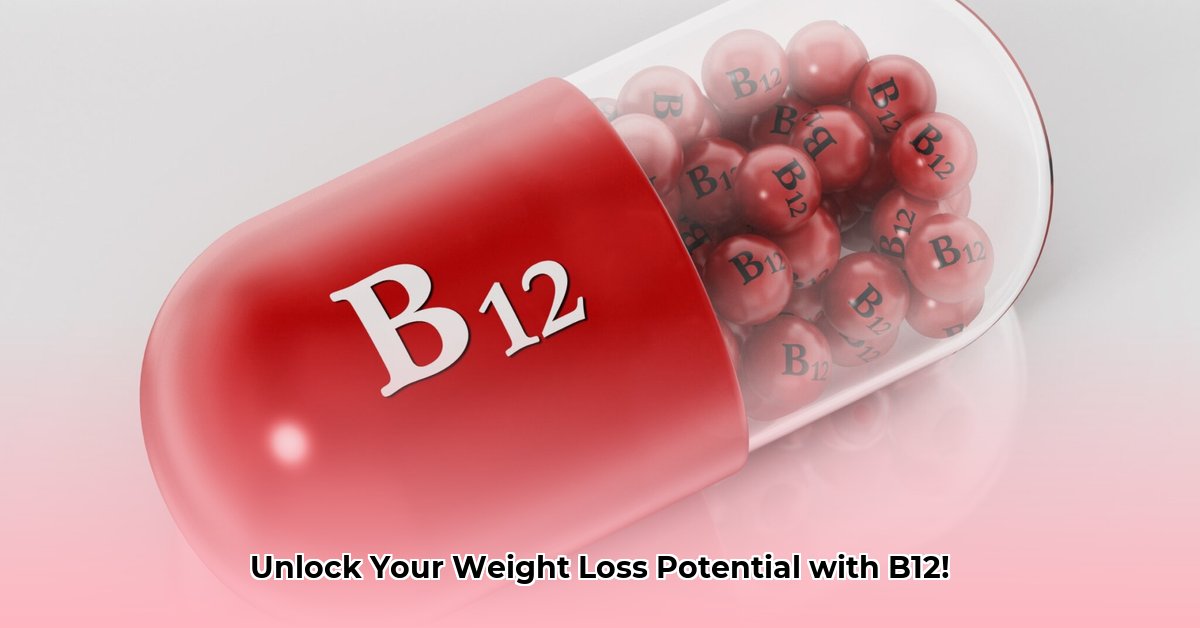
B12 and Weight Loss: Separating Fact from Fiction
The internet is awash with claims about vitamin B12 and weight loss. But does boosting your B12 levels actually lead to significant weight reduction? The truth is more nuanced than many marketing campaigns suggest. While B12 plays a crucial role in energy metabolism, it's not a miracle weight-loss solution. This guide will explore the science, the options, and the safety considerations surrounding B12 supplementation for weight loss.
Understanding B12's Role in Your Body
Vitamin B12 is essential for converting food into energy. A deficiency can lead to fatigue and sluggishness, hindering weight loss efforts. However, simply increasing B12 levels won't melt away fat. Think of it this way: B12 is like adding high-octane fuel to a car—but if the engine is broken, it won't go faster. Weight loss requires a holistic approach. Could a B12 deficiency be impacting your energy levels and making it harder to stick to a healthy lifestyle?
B12 Supplementation: Your Options
You can increase your B12 intake through various methods:
- Oral supplements (pills): Convenient and readily available, but absorption can be less efficient than injections.
- Injections: Often offered at clinics or B12 stores, injections provide a rapid B12 boost.
- Diet: A balanced diet rich in meat, poultry, fish, and dairy products is often sufficient for meeting your B12 needs.
Which method is right for you? A simple blood test can determine if you have a deficiency and whether supplementation is necessary. Your doctor can guide you on the best approach.
The Weight Loss Connection: What the Research Shows
Studies suggest that addressing a B12 deficiency might improve energy levels and make weight loss easier for some individuals. However, there's no conclusive evidence that B12 supplementation alone causes significant weight loss. Many weight-loss products heavily feature B12, but solid scientific backing for these claims is often lacking.
Sourcing B12: Online vs. In-Person
Choosing between online and in-person B12 sources involves a trade-off between convenience and safety. Online retailers offer convenience, but you're responsible for proper handling and administration. Clinics provide professional guidance and oversee injections, but usually at a higher cost. Regardless of your choice, prioritize reputable sources with quality certifications and positive reviews. How can you effectively assess the credibility and safety of your B12 source?
Prioritizing Safety: Potential Risks and Precautions
Regardless of your B12 source, safety is paramount:
- Follow instructions precisely: Incorrect usage can lead to side effects.
- Monitor for side effects: Report any unusual symptoms to your doctor immediately.
- Consult your doctor: This is crucial before starting any supplement regimen, especially if you take other medications or have existing health conditions.
Realistic Expectations: B12 and Weight Management
Let's be clear: B12 isn't a magic bullet for weight loss. It supports energy production, but it won't replace a balanced diet, regular exercise, and a comprehensive weight-loss plan. Consider B12 as a potential supporting element, not the main driver of your weight-loss goals.
Pros and Cons: In-Person vs. Online B12 Supplementation
| Feature | In-Person Clinic/Store | Online Purchase |
|---|---|---|
| Administration | Professional; potentially faster results | Self-administration; requires careful instruction |
| Cost | Higher | Lower |
| Convenience | Less convenient | More convenient |
| Consultation | Often included | Usually absent |
| Monitoring | More likely | Less likely |
Remember, a long-term weight loss plan requires consistent lifestyle changes. Always consult a healthcare professional before starting any new supplement regimen.
How to Safely Self-Administer B12 Injections at Home (If Recommended by Your Doctor)
Disclaimer: Self-administering injections should only be done under the direct guidance and instruction of a qualified healthcare professional. This section provides basic information only and does not replace professional medical advice.
Choosing Your Injection Method
Two methods exist: subcutaneous (SQ) and intramuscular (IM). SQ injections are generally easier and less painful, involving injecting under the skin. IM injections, while offering potentially faster absorption, require precise technique and can be more painful. Your doctor will advise on the appropriate method. Is there a specific method your doctor has recommended for you?
Step-by-Step Guide to Safe B12 Self-Injection (SQ Method) (Only if your doctor has explicitly instructed you to self-administer)
This section is intentionally omitted due to the inherent risks involved in providing self-injection instructions without the supervision of a medical professional. Always consult your doctor for personalized guidance on any medical procedure.
Risk Assessment and Mitigation (For informational purposes only)
Even with proper technique, risks exist such as infection, bruising, and nerve damage. Strict hygiene is crucial to minimizing these risks.
| Risk Factor | Severity (1-5) | Likelihood (1-5) | Mitigation Strategy |
|---|---|---|---|
| Infection | 4 | 2 | Strict hygiene, proper disposal of sharps, monitor for symptoms |
| Improper Injection | 3 | 2 | Proper technique, guided by your healthcare provider |
| Allergic Reaction | 5 | 1 | Consult your physician beforehand, monitor for reactions. |
This information is for educational purposes only. Always follow your doctor's recommendations and seek medical attention if complications arise. Never self-administer injections without explicit authorization and guidance from a qualified medical professional.